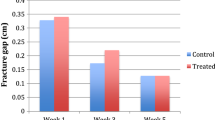Summary.
The aim of our study was to observe the incorporation and induced immune response of sterilized bone allografts. We performed an orthotopical tibial segment transplantation using two different inbred rat strains. We compared irradiated (25 kGy), autoclaved (134 °C) and cryopreserved (–80 °C) bone grafts. The observation took place 6 and 12 weeks post-operativelely. Results: The incorporation of irradiated grafts took longer than cryopreserved transplants. Autoclaved grafts were not incorporated and only bridged by new callus formation. A cell-mediated immune response against the cryopreserved grafts could be demonstrated. Irradiated grafts induced a minor immune response; autoclaved grafts did not. Conclusion: There seems to be a correlation between loss of antigenicity and failure of graft incorporation. Therefore, it seems probable, that some bone antigenicity is necessary for the induction of cellular mechanisms during graft incorporation.
Zusammenfassung.
Fragestellung: Ziel unserer Arbeit war es, das Einheilungsverhalten und die immunologischen Reaktionen sterilisierter allogener Knochentransplantate (Tx) zu untersuchen und mit den Ergebnissen von kältekonservierten zu vergleichen. Methodik: Als Modell diente die orthotope Tibiasegmenttransplantation an der Ratte. Wir verglichen strahlensteriliserte (25 kGy), autoklavierte (134 °C, 5 min) und kältekonservierte (–80 °C) Tx miteinander. Der Beobachtungszeitraum betrug 6 und 12 Wochen p. o. Ergebnisse: Die Einheilung der strahlensterilisierten Tx verlief deutlich langsamer als bei den kältekonservierten Tx. Die autoklavierten Tx heilten nicht ein, sondern wurden nur von einer Callusbrücke umschlossen. Celluläre Immunreaktionen gegen kältekonservierte Tx waren bis zum Versuchsende nachweisbar. Strahlensterilisierte Tx induzierten nur zur 6. Woche eine stärkere Immunreaktion, bei den autoklavierten Tx konnten wir keine Immunreaktion nachweisen. Schlußfolgerung: Die Korrelation zwischen Antigenitätsverlust und schlechtem Einheilungsergebnis läßt vermuten, daß eine gewisse Knochenantigenität für die Induktion der cellulären Umbauvorgänge notwendig ist. Eine völlige Zerstörung der Antigenität führt deshalb auch zum Verlust der biologischen Wertigkeit eines Knochentransplantats.
Similar content being viewed by others
Author information
Authors and Affiliations
Rights and permissions
About this article
Cite this article
Schratt, HE., Spyra, J. Experimentelle Untersuchungen zur Einheilung und Antigenität von sterilisierten Knochentransplantaten. Chirurg 68, 77–83 (1997). https://doi.org/10.1007/s001040050154
Issue Date:
DOI: https://doi.org/10.1007/s001040050154




